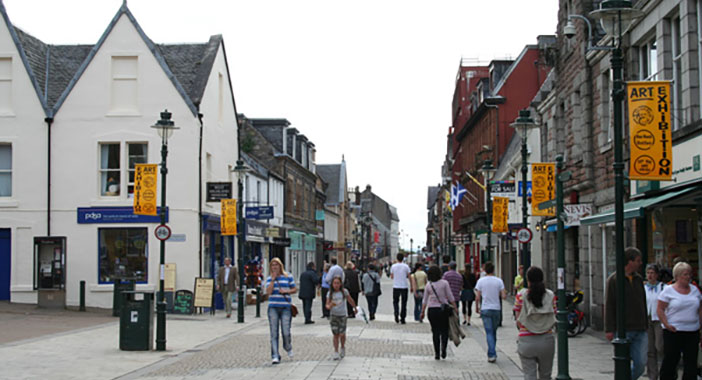Scotland’s towns and the climate emergency

To introduce our Climate Action Towns work, we asked partners across Scotland to write about how Scotland’s towns can address climate change. Here Phil Prentice of Scotland’s Towns Partnership outlines how the nation’s towns can tackle the climate emergency.
As we emerge from the hugely disruptive and damaging COVID-19 pandemic, the daily news bulletins and all the science is shifting attention to the climate emergency and showing us a planet under pressure and a neglected existential threat. Surely problems of this magnitude require big solutions, or do they?
Perhaps by turning the problem on its head and looking at it differently we could create more innovative and deliverable solutions while encouraging wider re-education, participation and behaviour change.
Radical incrementalism
Climate change is already upon us. While the biggest contributors to carbon emissions (energy and transport) are being aggressively addressed at the macro level, we are already seeing changes to our precious ecosystem like coastal erosion and extreme weather events.
But Scotland is blessed with an abundance of natural resources that can help address climate change. As a nation of towns, how can we encourage our businesses and townsfolk to play a vital role in our battle to save the planet and embrace the opportunities presented by a greener and fairer recovery? The answer lies in ‘radical incrementalism’.
If we start with the simple question, ‘what can I as an individual do’ and then ask ‘what can we as a community do’, we start to open up the art of the possible. And if these actions can be replicated across multiple towns, while having a local, direct and highly visible focus, collectively they can have a national impact.
The dramatic and unprecedented COVID-19 lockdowns saw global greenhouse emissions drop by 6%. Science is now telling us that we need to reduce emissions annually by 5% for the next few decades. This means everything needs to change. So how can radical incrementalism or ‘massive small’ deliver for our towns?
Climate action in towns
Much of the change has already started. COVID-19 has created new working, educational, living and commuting patterns, much of which will be consolidated.
A lot can be achieved by taking small, collaborative steps to embed and build on this return to localism. A good example is Scotland Loves Local, which is supported by a national media campaign, a £10m fund, national awards, and the Town and City Gift Cards platform.
Scotland Loves Local
Scotland Loves Local is an attempt to build on the positives created by a pandemic: resilience, compassion, community wealth, awareness of what is around us, and what is precious.
In the context of towns, we hope this programme will lead to more local shopping, active travel, and home insulation, among the many other ways to tackle the climate emergency.
Emerging best practice in Scotland
There is growing awareness and a lot of emerging best practices across Scotland. The Core and Halo projects in East Ayrshire, Greener Kirkcaldy, Sustainable Dunbar, and Edinburgh’s and Glasgow’s green transport corridors and low emission zones are just a few examples.
COP26 is potentially the most important global conference in our history. Let us use this to showcase the art of the possible, a radical approach, and the role that towns can play.
About the author
Phil Prentice is CEO of Scotland’s Towns Partnership, the organisation leading on Scotland Loves Local. He is also National Programme Director for Scotland’s Improvement Districts and a director of the UK High Streets Taskforce.
Share your place-based climate action
We would like to hear from communities and local authorities who are creating carbon conscious places. If you are designing and adapting a place to reduce, repurpose and absorb carbon, please share examples of your work with us.
